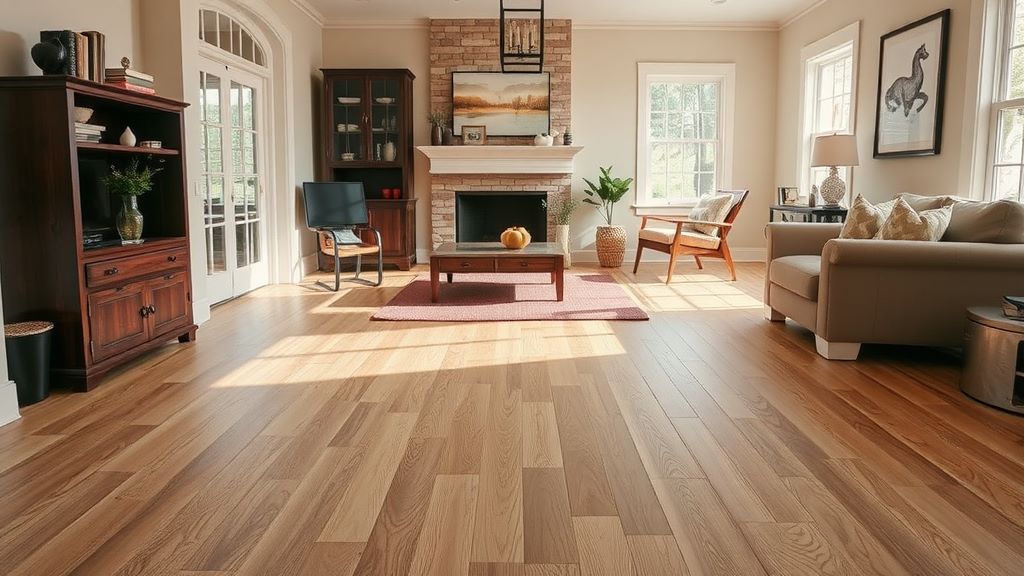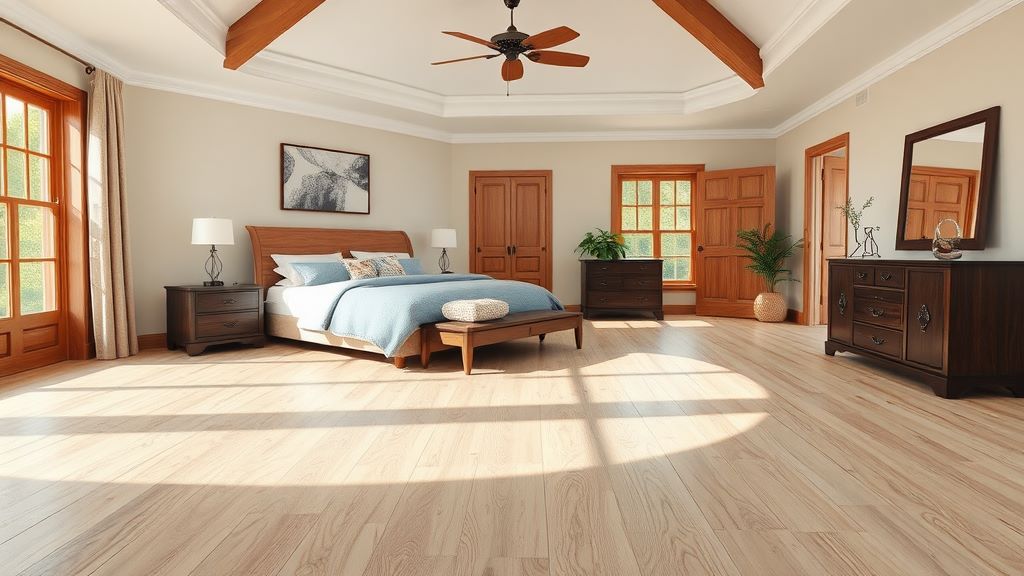
White oak hardwood flooring is a classic choice that brings warmth and elegance to any home. Its durability, versatility, and natural beauty make it a popular option for homeowners and designers alike. In this comprehensive guide, we’ll explore the many aspects of white oak hardwood flooring, from its characteristics to installation and maintenance.
What is White Oak Hardwood Flooring?
White oak hardwood flooring comes from the white oak tree, known for its strength and resilience. Despite its name, white oak wood actually has a light to medium brown color with hints of yellow or pink. This hardwood is prized for its tight grain pattern and ability to resist wear and tear.
White oak’s durability makes it an excellent choice for high-traffic areas, such as kitchens and living rooms. Its natural resistance to moisture also makes it suitable for areas like basements, where other hardwoods might struggle.
Benefits of White Oak Hardwood Flooring
- Durability: White oak is one of the hardest domestic hardwoods, making it resistant to dents and scratches.
- Versatility: Its neutral color palette complements various design styles, from traditional to contemporary.
- Water-resistant properties: While not fully waterproof, white oak is more resistant to moisture than many other hardwoods.
- Stain options: White oak takes stains well, allowing for a wide range of color options.
- Long-lasting beauty: With proper care, white oak flooring can last for generations.
Installing White Oak Hardwood Flooring
Installing white oak hardwood flooring requires careful planning and execution. While some homeowners opt for DIY installation, hiring a professional often ensures the best results.
Before installation, it’s crucial to acclimate the wood to your home’s environment. This process typically takes 3-5 days and helps prevent future warping or gaps.
The installation method depends on your subfloor and personal preference. Options include:
- Nail-down installation
- Glue-down installation
- Floating floor installation
Finishing White Oak Hardwood Flooring
One of the advantages of white oak is its ability to accept a variety of finishes. From light natural looks to rich, dark stains, the options are nearly endless.
Popular finishes for white oak include:
- Clear coat: Enhances the natural beauty of the wood
- Gray wash: Creates a modern, beachy look
- Dark walnut: Adds depth and sophistication
- Whitewashed: Brightens the space and complements coastal or farmhouse styles
Remember that the finish you choose can significantly impact the overall look of your space. Consider how it will complement your existing decor and furniture.
Maintaining White Oak Hardwood Flooring
Proper maintenance is key to keeping your white oak hardwood flooring looking beautiful for years to come. Here are some tips:
- Sweep or vacuum regularly to remove dirt and debris
- Clean spills immediately to prevent staining
- Use furniture pads to prevent scratches
- Avoid using harsh chemicals or excessive water when cleaning
- Reapply finish as needed to protect the wood
For high-traffic areas, consider using area rugs to protect the flooring. Just be sure to use rug pads that won’t discolor the wood.
White Oak vs. Other Hardwoods
When choosing hardwood flooring, it’s helpful to compare white oak to other popular options:
- Red Oak: Slightly softer than white oak, with a more pronounced grain pattern
- Maple: Harder than white oak, but more prone to expansion and contraction
- Walnut: Softer than white oak, with a rich, dark color
- Hickory: Harder than white oak, with a more rustic appearance
Each wood species has its unique characteristics, so consider your specific needs and preferences when making a decision.
Cost Considerations
White oak hardwood flooring is generally mid-range in terms of price. Factors that can affect the cost include:
- Grade of the wood
- Plank width and thickness
- Finish type
- Installation method
While white oak may be more expensive than some options like laminate or vinyl, its longevity and ability to increase home value make it a worthwhile investment.
Environmental Impact
For environmentally conscious homeowners, white oak can be a sustainable choice. Look for flooring certified by the Forest Stewardship Council (FSC) to ensure it comes from responsibly managed forests.
White Oak in Different Room Settings

It can adapt to various room settings:
- Living Rooms: Creates a warm, inviting atmosphere
- Kitchens: Stands up well to foot traffic and spills
- Bedrooms: Adds a touch of luxury and warmth
- Home Offices: Provides a professional, timeless look
- Basements: Resists moisture better than many other hardwoods
Combining White Oak with Other Design Elements
White oak’s versatility allows it to complement various design elements:
- Wall Colors: Pairs well with both light and dark wall colors
- Furniture: Complements both modern and traditional furniture styles
- Cabinetry: Works beautifully with various cabinet colors and styles
- Trim and Molding: Can be matched or contrasted with white oak flooring
Common Misconceptions about White Oak Hardwood Flooring
Let’s address some common misconceptions:
- It’s too light: White oak can be stained to achieve darker hues
- It’s too expensive: While not the cheapest option, it’s a long-term investment
- It’s difficult to maintain: With proper care, white oak is relatively low-maintenance
- It’s not suitable for pets: White oak’s hardness makes it more resistant to pet scratches than many other woods
Conclusion
White oak hardwood flooring offers a perfect blend of beauty, durability, and versatility. Whether you’re renovating your home or building from scratch, it’s an excellent choice that can enhance the value and aesthetic appeal of your space for years to come. By understanding its characteristics, installation process, and maintenance requirements, you can make an informed decision about whether white oak is the right flooring option for your home.



